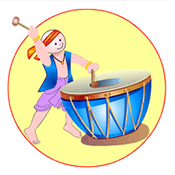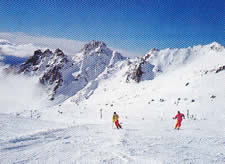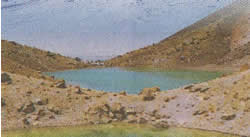
Dimdima
Online Children's Magazine from India

Dimdima
Online Children's Magazine from India

Tongariro is New Zealand’s oldest national park. It is a place of extremes & surprises. From herb fields to forests, from tranquil lakes to desert-like plateau & active volcanoes. This was the 1st national park to be established in NZ & the 4th in the world. To tangata whenua ( people of the land), the mountains are a vital part of their history. The 3 volcanic mountains, at the heart of the park – Tongariro, Ngaruahoe & Ruapehu form the southern limits of the Taupo Volcanic Zone. Volcanic activity in the zone started about 2 million years ago & is going on till today! Mt Ruapehu & Mt Ngaruahoe, are two of the most active composite volcanoes in the world. In 1995 & again in 1996, Mt Ruapehu has erupted sending clouds of ash & steam skywards & mantling the surrounding snow fields & forests with a thick film of ash. It is a land of strong contrasts with barren lava flows, winter snowfields, hot springs & active craters. Harsh environment & volcanic activities slows down the development of the diverse forests.
Harsh environment & volcanic activities slows down the development of the diverse forests.
The park is centered on 3 active volcanoes: Tongariro (1,968m), Ruapehu (2,797m) & Ngauruhoe (2,290m). Mt Ruapehu has a number of peaks : Tahurangi, Girdlestone, Te Heuheu, Paretetaitonga & Mitre.
Ngauruhoe has erupted at least every nine years. The last eruption was in 1975. Mt Tongariro last emitted ash in 1926. Mt Ruapehu is the highest point in the North Island. On top of Mt Ruapehu, is a crater lake which regularly passes through warming cycles. These cycles may result in small eruptions of ash & steam. More than 60 eruptions have been recorded since 1945. Ruapehu has the only commercial skifields in the North Island. In January 1991, Tongariro National Park was declared a World Heritage site & in 1994, the Park was also granted Cultural World Heritage status.
Dimdima is the Sanskrit word for ‘drumbeat’. In olden days, victory in battle was heralded by the beat of drums or any important news to be conveyed to the people used to be accompanied with drumbeats.
Bharatiya Vidya Bhavan
K. M Munshi Marg,
Chowpatty, Mumbai - 400 007
email : editor@dimdima.com
Bharatiya Vidya Bhavan
505, Sane Guruji Marg,
Tardeo, Mumbai - 400 034
email : promo@dimdima.com
Dimdima.com, the Children's Website of Bharatiya Vidya Bhavan launched in 2000 and came out with a Printed version of Dimdima Magazine in 2004. At present the Printed Version have more than 35,000 subscribers from India and Abroad.